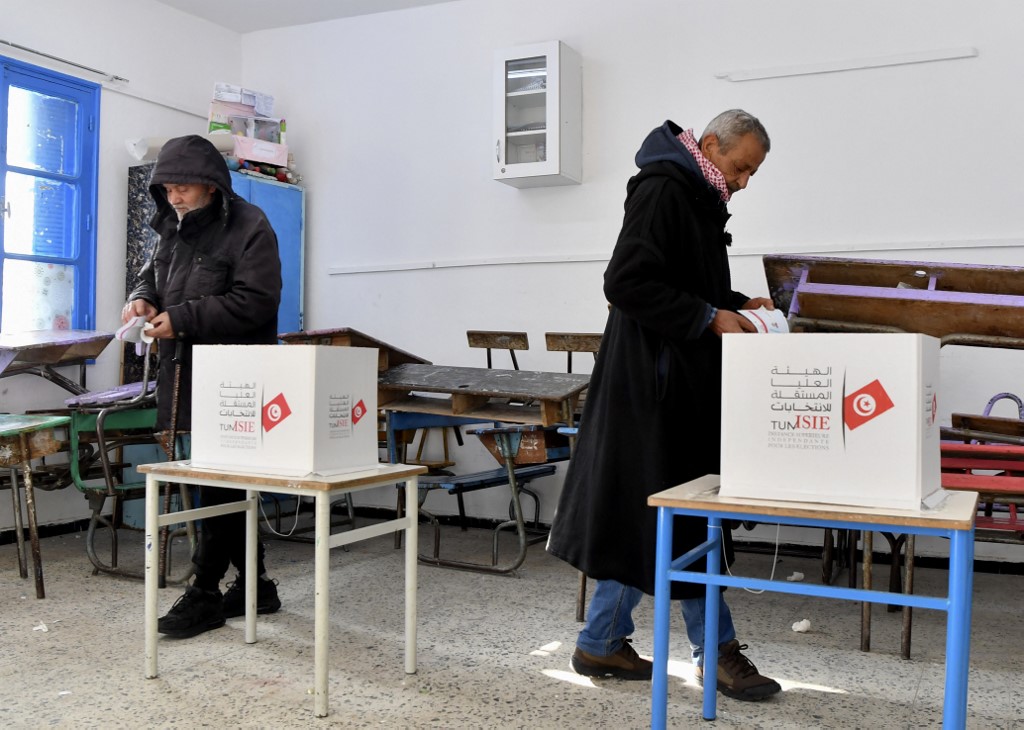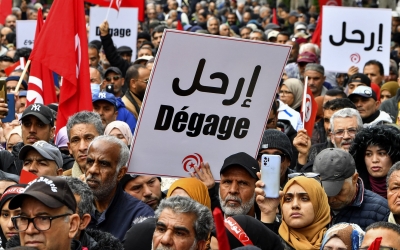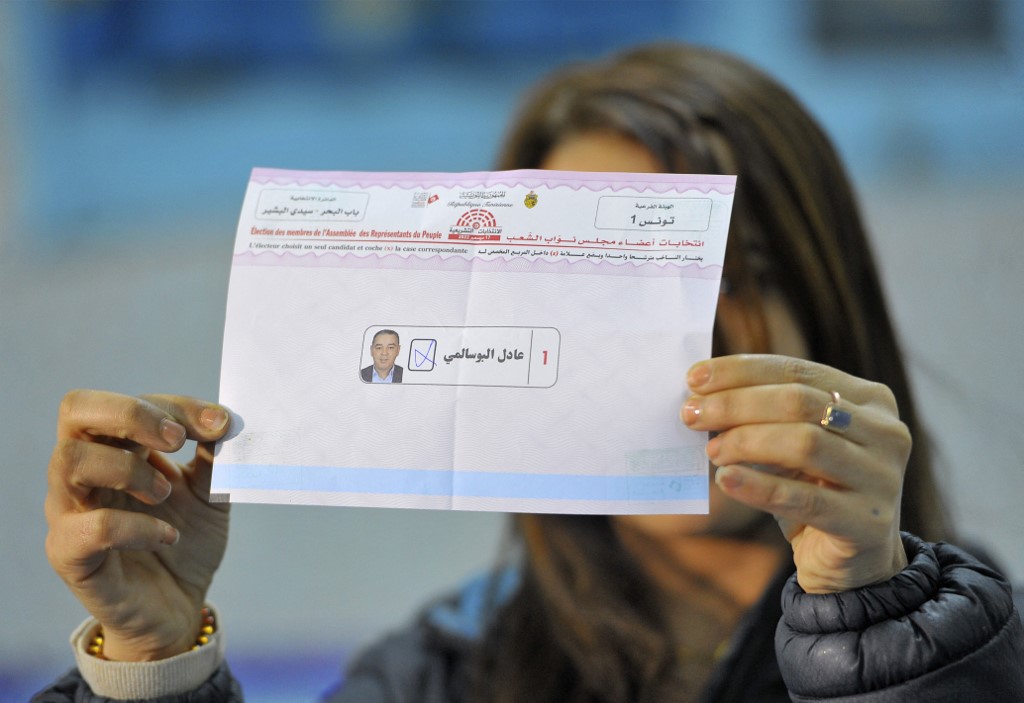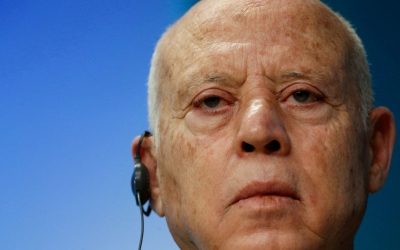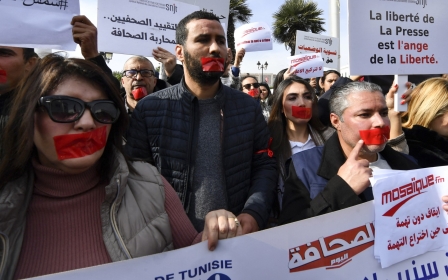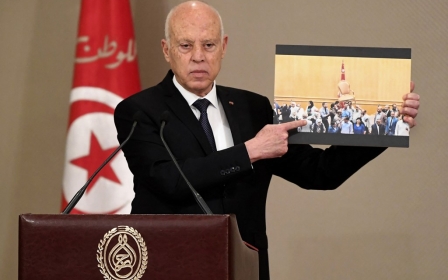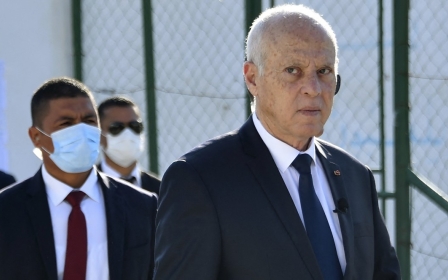Tunisia election looking far from fair as Saied’s rivals face exclusion and challenges
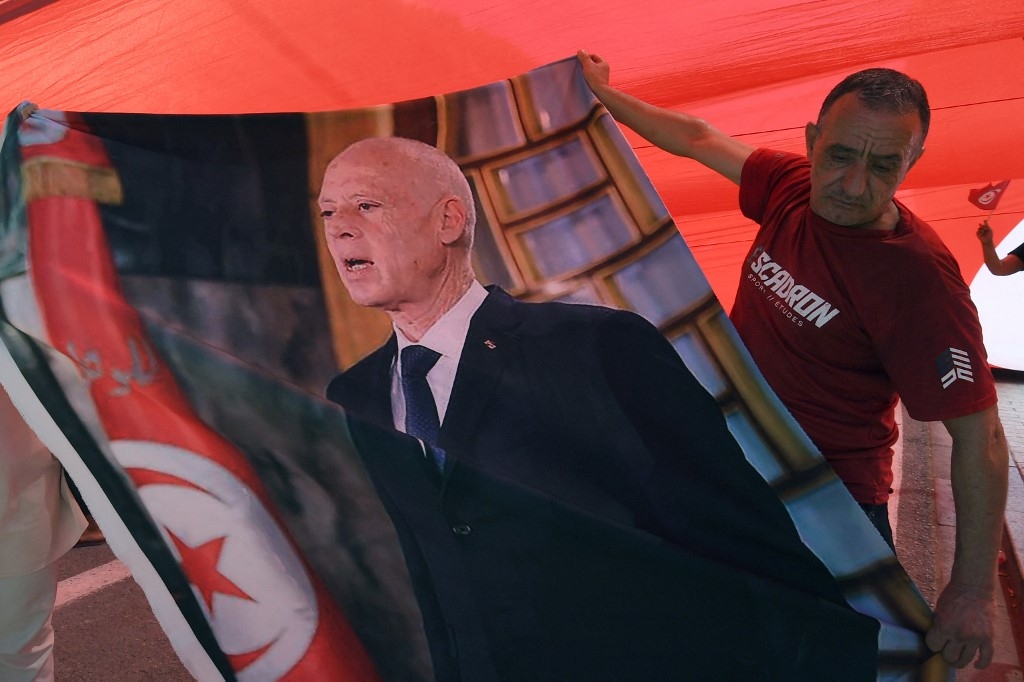
On the evening of Friday 19 July, the Facebook page of the Presidency of the Tunisian Republic broadcast a video where Kais Saied announced his intention to run for his re-election on 6 October.
The sequence was filmed in Borj el-Khadra, in Tunisia’s far south. Attached to symbols, the head of state justified the choice of this location by its history “permeated with the smell of activism”. By going there, he intended to reaffirm “the unity of the country from south to north”.
The former professor of constitutional law took advantage of his speech, integrally broadcast by the main public media, to attack his adversaries – whom he did not name – accusing them of disloyalty and conspiracy.
He also warned against “any intrusion which could sully the process of collecting signatures of support” for the presidential vote.
In his announcement, the president affirmed he would only rely on his own means, while the chairman of the Independent High Authority for Elections (ISIE) insisted on strict equality between the candidates. However, several elements show a differentiated treatment of aspirants to the supreme office.
New MEE newsletter: Jerusalem Dispatch
Sign up to get the latest insights and analysis on Israel-Palestine, alongside Turkey Unpacked and other MEE newsletters
The first inequity concerns access to state resources.
Saied’s announcement was filmed with state support in a closed military zone, inaccessible to ordinary citizens. The president therefore benefited from state resources for an act that does not fall within his function, in contradiction with the very content of his message.
Saied, who was elected president after running as an independent in 2019, began a series of power-grab measures in the summer of 2021 that concentrated executive, legislative and judicial powers in his hands. His opponents termed his power consolidation a “constitutional” coup.
‘A politically premeditated legal error’
The president’s self-granted privilege in announcing his candidacy contrasted with the verdict that fell the day before against another competitor, Lotfi Mraihi. The 64-year-old medical doctor, also presidential candidate in 2019 for the Popular Republican Union party (UPR, right), was arrested on 5 July. The authorities leaked the photo of his arrest.
Last week, the Tunis court of first instance sentenced him to eight months in prison and a life ineligibility. Although the content of the judgment has still not been made public, the media allude to corruption.
According to a message on Facebook by lawyer and former minister Mohamed Abbou, the judgment could have to do with the purchase of signatures in favour of Mraihi.
Abbou, who was also a candidate in 2019, considered the allegations “eccentric” in that the alleged facts took place in June while Mraihi was in hiding after his conviction in absentia earlier this year for describing Saied’s track record as negative.
An opinion shared by Mraihi’s son, who denounced the sentence against his father in a video.
For former administrative judge turned lawyer Ahmed Souab, this judgment is clearly illegal.
He explained to Middle East Eye that the lifetime ineligibility verdict stems from a decree-law issued unilaterally by Saied that modifies the electoral code concerning the legislative elections and penalises abuses committed on the day of voting.
However, Mraihi was not a candidate to become a lawmaker and the decree-law does not mention the gathering of signatures.
The sentence is “a politically premeditated legal error,” Souab told MEE.
Arrests and administrative obstacles
Mraihi is not the only candidate hampered by the Tunisian justice system.
On 12 July, a judge heard a former leader of the Islamist party Ennahda, Abdellatif Mekki, in an investigation related to the death of Jilani Daboussi, a former mayor of Tabarka (north-west) and member of deposed president Zine al-Abidine Ben Ali’s party.
Arrested after the 2011 democratic revolution, Daboussi died in jail in 2014. A complaint was filed against officials of the Justice Ministry because Daboussi had remained in detention without trial beyond the 14-month legal period.
Mekki, who was health minister at the time, had so far been spared by investigators. But after his hearing in July, he was prohibited from leaving the territory, making public statements and traveling beyond his neighbourhood in the southern suburbs of Tunis.
Concretely, these measures prevent him from running a campaign. Although he left Ennahda and founded his own party, Work and Realisation, Mekki, like Mraihi, tries to appeal to the same conservative electorate as Saied.
Another candidate hampered in the presidential race is Abir Moussi, the chairwoman of the Free Destourian Party (PDL, close to Ben Ali). Moussi, who declared her candidacy more than a year ago, has been in detention since October 2013.
She was arrested for protesting against the non-issuance by the presidency of a receipt that would have allowed her to contest electoral boundaries in court.
Despite her arrest, the PDL maintains its support for Moussi. But the ISIE keeps refusing to issue her the necessary form to collect support signatures.
The electoral authority also filed several complaints against her, some of which resulted in the issuance of committal orders, on the basis of Decree-Law 54.
The legislation, officially aimed at fighting cybercrime and “fake news”, allows the authorities to repress opponents with sentences of up to 10 years in prison. Rights defenders note that the authorities never prosecute the authors of fake news when they are on their side.
Moussi’s lawyer, Nafaa Laribi, told MEE about the obstacles encountered in her presidential bid.
“At the beginning, the ISIE asked us for a special power of attorney from our client, whereas a lawyer has an ad litem mandate [for the purpose of legal action]. They demanded that a court bailiff gets Ms Moussi’s consent in prison but the judges have still not issued the authorisation allowing the bailiff to visit her in jail,” he explained.
Laribi said Moussi’s legal team challenged the ISIE’s refusal before the administrative court.
Doubts over independence of electoral body
Two other figures considered to be “political detainees” by rights groups have also announced their intention to compete in the October election.
Issam Chebbi, former lawmaker in the National Constituent Assembly and secretary general of the opposition al-Jomhouri party (centre), and Ghazi Chaouachi, ex-minister and former leader of Attayar (centre-left), have been incarcerated since February 2023 in the framework of the so-called “plot against state security”.
The case targets opponents who are being prosecuted under around 15 charges that could lead to the death penalty. The media are prohibited from addressing the file, which is empty according to the lawyers.
The seven men accused in this case have exceeded the legal 14-month detention period without trial. In February 2023, President Saied declared that those who would dare pronounce a verdict of innocence would be considered accomplices of the defendants.
While Chebbi withdrew his candidacy last Thursday due to failure to obtain support forms, Chaouachi maintained his own.
His son Elyes Chaouachi told MEE that his father had to face administrative harassment similar to that experienced by Moussi.
“Yet, my father had mandated my brother to represent him before all administrations, including the [electoral] authorities, having in mind the possibility of running as a candidate,” he told MEE.
“The power of attorney was validated by the investigating judge. This did not prevent the ISIE from requiring a specific mandate at each stage of the process – for the signatures of support, for the bulletin number 3 [extract from the criminal record]. We appealed to the administrative courts, which dismissed us at first trial.”
The question of ballot number 3 (B3) is also a means of implicit selection of presidential candidates in the hands of the administration. The deadline for its issuance is at the discretion of the state services. The failure to give candidates this precious door opener prevents them from competing.
A situation that is all the more disturbing as the ISIE, as a state body, has all the means to check candidates’ history. In 2014, the administrative court ruled against the requirement, saying that candidates had only to provide proof that they had requested a B3 for their file to be accepted.
But the ISIE decided to ignore the ruling. Candidates have until 6 August to submit complete applications.
Among the decisions that could disadvantage Saied’s opponents is the possibility, mentioned by the ISIE, of compelling candidates to publish the list of signatures of sponsor they collected.
Since the 2014 elections, many citizens and political leaders have denounced the trafficking of signatures. A telephone service has been set up for voters to check if their identity has been used to sponsor someone without their knowledge.
This year, the electoral body has tightened the conditions by requiring the original copy of the sponsor slip and adding the photo of the sponsored candidate.
However, the possibility of making these lists public can discourage many citizens. In addition to the exposure of personal data, it could lead to retaliation.
For instance, the Regional Council of Nabeul (east), a new structure resulting from the Constitution pushed by Saied in 2021 and whose members are mostly close to the head of state, publicly criticised one of its members for supporting Kamel Akrout, a former chief of staff of the Navy running for president, describing the move as “unilateral and irresponsible”.
In the current repressive climate, where many opponents are taken to court or imprisoned, the impartiality of the October election seems therefore far from being guaranteed.
Last week, Amnesty International denounced a “hardening of repression against the opposition” after the arrest of Ennahda’s secretary general Ajmi Ouirimi and two members of the party. Ennahda, which was part of all government majorities from 2011 to 2021 after the revolution, is Saied’s bete noire.
“These arrests are particularly worrying as the presidential election gets nearer,” Amnesty said, condemning “arbitrary arrests of journalists, lawyers, activists and political leaders, but also a systematic undermining of the independence of the judiciary.”
For its part, the Tunisian NGO I Watch reported “complicated procedures” for the upcoming election, particularly for applicants in preventive detention, as well as “a methodical absence of transparency [of the ISIE]”.
Created in 2011 to take the organisation of elections out of the control of the Interior Ministry, the independence of the electoral body was previously guaranteed by its method of appointment: members were elected by a reinforced majority of two thirds of the legislative assemblies.
But since the 2021 coup de force, ISIE’s members have been directly or indirectly chosen by Saied.
The current composition of the body, where seven members sit, is also unconstitutional according to the Basic Law of 2022 promoted by the president himself, which requires the body to be made up of nine officials.
Middle East Eye delivers independent and unrivalled coverage and analysis of the Middle East, North Africa and beyond. To learn more about republishing this content and the associated fees, please fill out this form. More about MEE can be found here.


